The trail, if you could call it a trail, followed a long rising bench above the river. The rain had stopped but everything was drippy wet and it seemed that each disturbed drop had managed to find its way into my hip waders. Cresting a small rise I spotted the main section of a freshly killed caribou spine in the trail, strings of meat trailing in all directions and crushed rib bases still scarred by powerful teeth. I thought I had heard a cracking sound but couldn’t be sure. My hand started for the .44 magnum on my belt, but on second thought slid under my fleece jacket and pulled the slick canister of bear pepper spray from an inside pocket. I slipped the safety clip off and listened. Silence–I liked that. Hearing nothing I pressed on, giving the spot a wide berth.
I glanced at my watch and saw that it had been an hour and a half since I said, “goodbye” to my friends Bryan Burkhardt and Kevin Dill in their camp. We had been dropped in by Super Cub the day before, in a blowing rain, and the boys had graciously allowed me to bunk in their tipi since I had no camp or gear. I had shoved my gear out of the Super Cub six foot-miles up the valley, as the pilot fought the wind and rain and tried to keep the airplane out of the trees. I dropped the bundled raft into a beaver pond where it hit with a splash and skipped into the air, landing against a sun-bleached pile of logs. I remembered the four-inch rip I had repaired in the bottom and hoped it would hold.
Sleep had been tough the night before with no gear, but Bryan had graciously given me his sleeping pad to keep me off the wet ground, and I had covered myself with a plastic tarp. All was well in my damp clothes and hip waders until the fire went out. The boys had taken turns firing up the stove and gas burner to ward off my chills. The pitter-patter of steady rain made the soft crackling of the fire soothing. It was good to be back in the bush.
September 11, 2011 dawned cold and wet, and promised more. We had our coffee and oatmeal and Bryan unwrapped two small American flags as we posed by the fire pit and had a prayer for our country. Then I slipped under the straps of my pack, thanked Bryan and Kevin for their hospitality, wished them luck and headed up river. I had a six mile forced march to reach the drop zone where the search for my gear would begin.
It was half past twelve when I stopped for my first break to take a photo of a fresh moose rub beside a beaver pond. The smooth mirrored surface reflected the brilliant fall colors and the silence soothed my soul. I stood for several minutes and simply tried to soak it all in. This was solitude but there was more where I was headed so I shouldered my pack and resumed my march up the valley.
I thought back to 2008 and the first time my buddy, Bob Nancarrow, and I had air-dropped our gear and packed up this valley. I remembered the feeling of security a friend gives you — someone to share the dangers with, someone who has your back, so to speak. But Bob had other commitments this time and I had chosen to go alone.
I followed the river where it cut against the mountain and crossed where I could. A fine cold mist kept everything wet, but at least it wasn’t pouring rain and I made good time.
Nearly two hours later I dropped down and crossed the river just below our old camp from 2008 and entered the willow and alder thicket below my campsite and started bird-dogging for my gear. I was wet and tired. I had just reached the trail that cut through a patch of heavy trunked black spruce and spotted my plastic-wrapped sleeping bag high and dry on a soft bed of pinecone chips, as if it had been placed there for safekeeping. It was one of the few dry places in the forest, and only forty yards from my campsite. Then, almost in the trail less than twenty-five yards from the camp, my duffle containing my tent and tarp. I whispered a short prayer of thanks and set about the task at hand.
Once my camp was up I was ready for a rest. But first, I had to search for my missing gear. Everything in the forest was soaked from twenty-four hours of rain, so fire and boiling water were next on the list, not to mention my bag of Mountain House meals. For the next hour I searched for the bags. My first discovery was my Coleman fuel. I remembered seeing it hit the water. I found the once padded can ripped apart and empty. The rain had erased the scent of fuel. “No fuel, no need for a fuel burner,” I said to myself, “I’ll use wood.” I cut three spruce poles six feet long and lashed the tops together into a tripod. Then I fastened a section of light wire and bent a hook in the bottom and hung my coffee pot on that. I built a small tepee fire and filled the pot with water from the stream flowing from the beaver pond. The tripod was easily adjusted, by moving one or more legs to center the pot over the flame, and I had boiling water in fifteen minutes.
I found the food bag and called off the search. It was nearly four pm. One bag was never located. I had some hot soup, crawled into my tent, removed my wet boots and clothes for the first time in nearly 30 hours, snuggled into my down bag and fell peacefully asleep.
I dreamed that I heard a bull grunting. When I heard it again, I jerked upright and pushed the dial on my watch in the fading light. It was eight thirty. I dressed, pulled on my boots, and crawled out of my tent. The light was fading fast as I grabbed my bow and eased out to the beaver pond.
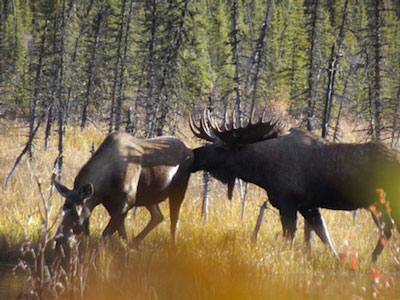 A mature cow was standing in yellow grass about sixty yards across the pond. Behind her stood a yearling cow. They were both looking across a deep channel of water toward an old abandoned beaver lodge, now covered with weeds and low brush. Antler tips moved in the brush and out stepped a good bull. He was already up to his chest in the water and waded across. “This is a very good sign,” I whispered to myself as I tried to hold the tiny camcorder steady. The wind was drifting more or less in their direction and stalking over open water was out of the question. I simply accepted the gift as it was given. They soon faded into the darkness.
A mature cow was standing in yellow grass about sixty yards across the pond. Behind her stood a yearling cow. They were both looking across a deep channel of water toward an old abandoned beaver lodge, now covered with weeds and low brush. Antler tips moved in the brush and out stepped a good bull. He was already up to his chest in the water and waded across. “This is a very good sign,” I whispered to myself as I tried to hold the tiny camcorder steady. The wind was drifting more or less in their direction and stalking over open water was out of the question. I simply accepted the gift as it was given. They soon faded into the darkness.
I sat by my little fire and thought about the logistics of what it had taken to plan this trip, to travel from my home in South Carolina to this camp, and what I may face in the way of challenges before I would be safely back with Annie. I bowed my head and thanked God for the solitude and the Mountain House. It was peaceful here alone. I sat by my fire, its soft glow illuminating the black spruce trunks, and listened to the chittering of the Boreal owls as they hunted the mice and lemmings.
For the next twelve days, solitude was my constant companion and I thrilled at the autumn splendor of the Alaskan bush. I was awed by the beauty of God’s creation in the full moon rising above snowcapped peaks and ice forming on the surface of the beaver pond and the constant babble of the river as it gently called my name and at times sounded like muffled voices floating on the wind in the trees. There is peace in solitude for those who learn how to listen and to see. For some it comes early; for many, it never comes at all. I feel sad for them, but seldom long for their company.
Days began long before first light and were spent calling, scraping and rattling brush with a couple of close encounters. Hunting alone in grizzly country requires constant vigilance, especially when walking back to camp in the dark. I made it a habit to walk with my canister of bear pepper spray in my hand and my thumb on the trigger.
The final day of the hunt dawned clear and cold and I called softly from my blind of spruce brush. I heard a clash of antlers up river and a grunt. I raked a tree with a moose shoulder blade and heard a response. Minutes later I heard a low grunt and saw antler tips moving up through the trees. The bull was following the trail that passed in front of me at eight yards. He was a good bull and his antlers rocked from side to side as he came. He walked around a clump of spruce and passed in front of me. The thirty-nine year old Bear takedown thumped, and the Zwickey Delta-tipped 1000 grain arrow vanished through thick hair. The bull lunged forward and trotted thirty yards, then began to back up as his hind legs buckled under the tremendous weight. The head and rack lifted high into the air as he crashed nearly backwards, and it was over.
A flood of emotion poured over me as I tried to soak it all in. I dropped to my knees and thanked God for the gift. It was every bowhunter’s dream come true.
The arrow was lying beyond the trail, a complete pass through. As I walked up to the bull I replayed the last twelve days in my mind, and then peeked into the future just a little and saw a massive amount of work. It was 9:30 a.m.
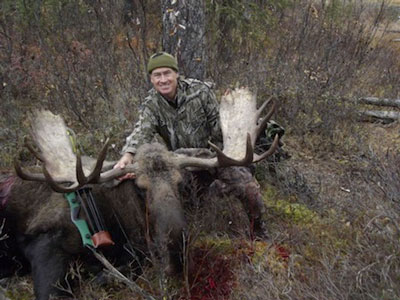 After photographs, I unpacked the bear spray and the .44 magnum and placed them on the carcass in easy reach. Then, for the next eight hours I skinned, bagged, and packed meat to the river where I submerged the bags under thirty-four degree water. That solved two problems, washing off excess blood and scent to hide the meat from bears, and it cooled quickly. Paracord kept them from washing away. I dropped the rack at the river at 6 p.m. and trudged thankfully into camp for the first rest of the day. The easy part was over.
After photographs, I unpacked the bear spray and the .44 magnum and placed them on the carcass in easy reach. Then, for the next eight hours I skinned, bagged, and packed meat to the river where I submerged the bags under thirty-four degree water. That solved two problems, washing off excess blood and scent to hide the meat from bears, and it cooled quickly. Paracord kept them from washing away. I dropped the rack at the river at 6 p.m. and trudged thankfully into camp for the first rest of the day. The easy part was over.
Later, I pan seared some tenderloin and simply relaxed and savored the food and the solitude. I sat for some time just enjoying the fire and mulling it all over. I thought about the bear bait just a few feet from camp, and remembered the big grizzly that had strolled through our camp in 2008, the day before he took Bob’s caribou. I thought about the river and the logistics of getting the loaded raft down that sweeper-infested stretch of water.
I decided to let tomorrow take care of itself, and replayed the part in my mind when the bull came rocking into my call. I saw the big feathers spinning toward hair, the nock vanished and I knew the shot was perfect. The little fire crackled, and it felt good just to be a part of it all.
The first gray light of morning came with the whiskey jacks calling from the carcass, then the ravens toking from the treetops. From somewhere just up river, the nasal bawl of a cow moose lamenting the loss of one of her suitors. I wondered if the bear had found the carcass.
I finished my first cup of coffee and decided to take a stroll to the carcass to check for bear. A thin sheet of ice covered the beaver pond as I stalked in close to the brush-covered spot. Whiskey jacks were flying to and from the carcass. The last forty yards I cracked brush and talked out loud to the bear I hoped wouldn’t be there. I had the safety catch off the bear spray and my thumb on the trigger. At twenty yards I was relieved to see the hide still draped across the carcass.
“I’ll give him ’til midnight,” I thought, and strolled back to camp and had another cup of coffee. Then I started the process of breaking down camp. I was in no real hurry to leave because I wanted to arrive in the evening and not interfere with Bryan and Kevin’s last evening hunt. And, for the solitary hunter, or anyone for that matter, there is no promise of next year or tomorrow. I simply wanted to look at it again, to smell it and hear it and try to lock it in somehow, but it doesn’t work that way. So I said goodbye to it and packed my gear and the raft to the river in several trips.
I had dreaded this part of the hunt because I remembered it all from past floats down this stretch of river. But in the past, my buddy Bob and I fought it together. There had not been a single trip where one of us was not kicked into the icy water. This was the dangerous part and I knew I needed help. I knew that what we too-often use as a last resort, I needed as a first response. I dropped down on my knees and asked God for wisdom and strength and courage to face what lay before me. I asked for the faith that the disciples lacked when their boat was about to sink while Jesus slept peacefully in the back. In both accounts, Jesus rebuked them for their lack of faith.
The river is six miles of twists and turns. It very seldom covers one hundred yards before the rafter is forced to jump out or risk dangerous sweepers or log jams. Some log jams are so bad that up to half the water volume is diverted into another channel, creating rocky riffles where the raft drags bottom and has to be pulled into deeper water.
The Mariner was not a full size or professional raft but it was the right size and weight to be tossed out of a Super Cub. It was not designed for fast water, rocks, sweepers, or hauling 700 pounds of moose meat plus one grown man and all of his gear. Pile a moose rack and skull on top of that and you have the perfect recipe for disaster–that’s me. But I had no choice, so I loaded the raft, offered up another prayer and once again asked for the faith the disciples lacked. I felt good. I felt confident–the way I always do at the start of every adventure. This would be fun. The hunt had been a success, and I looked forward to seeing Bryan and Kevin in a few hours.
I shoved the overloaded raft into the current and glanced at my watch, it was 2 p.m. The raft picked up the speed of the rapids through a tight section where the rocks formed the left wall of the mountain and high banks with thick alder brush held the right.
I paddled hard to keep the raft straight, but it had no effect. The log jam was fast approaching, and I knew I had to get out or be sucked under the logs with the raft. I slipped off the back and held on to gain my footing, then made a run for shore in fast water. My foot slipped, and I went down hard, and I was rolled by the current up to my neck in icy water. The initial shock took my breath away, but I fought to my feet in a rush of panic and completely forgot about my faith. I struggled out of the water as the slack ran out in the rope and I realized that I couldn’t hold the weight of the raft. Water boiled over the back into the raft and I was being dragged across the rocks toward the water.
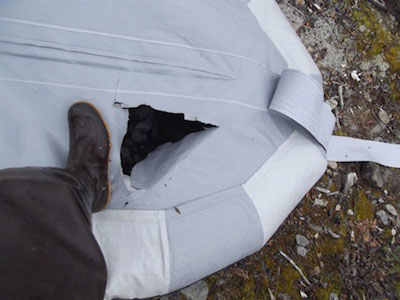 I shouted at God, “I could use some help here, now!” and I instantly felt ashamed and quite hopeless. Things were spinning out of control. The raft dropped into a narrow rush of water and there I saw the sun bleached roots of a washed up tree deposited there in the spring floods. I ran to it, slipped the rope around one stem, let the raft run a little then pulled it tight. It held, and then I was able to free the line and run to the next snag and brake again until I was able to work the raft into the shallows. Then I had to pack everything fifty yards. The raft was full of water. I found a twelve-inch triangle rip in the bottom. I no longer had the displacement floatation of the raft and was totally dependent on the tubes. Once loaded, the raft filled with water. Now it would be more easily sucked under the sweepers that lay before me.
I shouted at God, “I could use some help here, now!” and I instantly felt ashamed and quite hopeless. Things were spinning out of control. The raft dropped into a narrow rush of water and there I saw the sun bleached roots of a washed up tree deposited there in the spring floods. I ran to it, slipped the rope around one stem, let the raft run a little then pulled it tight. It held, and then I was able to free the line and run to the next snag and brake again until I was able to work the raft into the shallows. Then I had to pack everything fifty yards. The raft was full of water. I found a twelve-inch triangle rip in the bottom. I no longer had the displacement floatation of the raft and was totally dependent on the tubes. Once loaded, the raft filled with water. Now it would be more easily sucked under the sweepers that lay before me.
I was soaked, cold, and my hip waders were full of water. I once again changed the name of the raft from Challenger to Edmund Fitzgerald! I had no choice; I had to make the lower camp before dark. I said another prayer and apologized for my outburst and lack of faith. “Way to go Peter!” I said. There was no time for a fire. I shoved the half sunk raft into the current, gave a half-hearted, “yahoo,” and climbed up on my knees on the back. Some water poured out of my boots but then fresh water would pour in.
I had traveled the first short stretch and then the river turned sharply left and curved out of sight. In Alaska, what you can’t see can have a profound effect on the rest of your day. Scenes of last year’s float flashed through my mind, and I didn’t like what I remembered. I slipped off the back in the first riffles in fast water, let the raft run and fed line as I lunged for shore. Falling wasn’t an issue now that I was wet. Once on shore I loped along keeping the raft in slower water where I could guide it.
My memory was correct. The river made a long sweeping curve and narrowed into deep, fast water. For a hundred yards, a dozen sweepers dipped and swayed as the current tugged at the submerged tops. Most were live black spruce, their dense branches like underwater combs, ready to sweep gear and helpless rafters under. On big sweepers, the hydraulic pressure forces down and digs deep pools where the river suddenly becomes so deep that the bottom is lost from sight in the shadows. The older sweepers are dead trunks that have become nearly unbreakable, stripped of bark and limbs by years of sun and ice and spring runoff; these trees are especially dangerous to the rafter because they appear fragile, but they are not.
I lined the raft by the sweepers. Once clear, it became a series of short floats or walking the gravel bars and lining the raft in shallow water through an endless maze of sweepers. Time and again I had to use my folding saw to cut the top from a partially submerged spruce. Some trees were twenty inches in diameter and sixty feet tall. Actually, they were no longer tall, only long! Some trees bridged across from a high bank so that I could lie on my chest and float under. Others were completely blocking the river. Driftwood and logs caught by the blockage piled high and created powerful down surges of water pressure that could spell instant doom. Three times I had to completely unload the raft and then drag it to open water. I watched helplessly as water filled the raft, then with a kick and a prayer, climbed aboard and started again.
For every quarter mile of semi-straight water, the rest of the mile twisted and turned its way out of the hills with trouble in every turn. In some turns the current had eaten away the foundation, and a carpet of tundra was draped over the bank; spruce trees still attached at the base, but the trunks across the water. I found trees where I could have made a bridge, like the one Fred Bear was crossing on the Little Delta River, but I didn’t feel like building bridges.
Time and again I found myself in sections of water too deep to get out of the raft and too fast to control it, then the river would turn a bend and I would be racing toward a deep sweeper-blocked chute of churning water. My mind raced, but time waits for no man, and when you’re counting in seconds you react on pure instinct and raw fear.
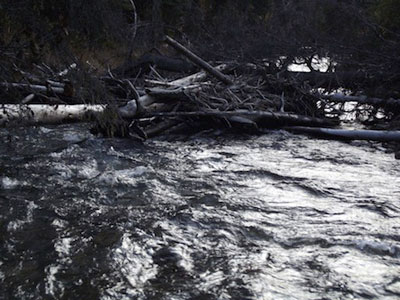 The first one caught me completely off guard, and I had no choice but to stand up and run across the top of my wet gear and jump through the moose rack onto the sweeper itself as the raft hit. After thirty-seven years as a high climbing tree guy, I felt quite at home! The trunk was just above the water and I thought I was going to lose everything. The raft was pushed down under the log, the water rushing in over the back and sides. The sound of the raft tubes scraping against sharp, broken limbs as it was forced under the log helped convince me of its destruction. But then, the front tube surfaced on the other side of the tree with most of my gear in place. I saw a ray of hope and used my boot to push the back of the raft under the tree and free it from the snags. It worked and as it cleared, I did a belly dive onto the top of my gear. Some water splashed out and new icy water filled my clothes and boots. The moose rack was still in place. I had to duck my head to slip under another tree, and when I cleared that, I saw parts of my gear bobbing cheerfully away in the current.
The first one caught me completely off guard, and I had no choice but to stand up and run across the top of my wet gear and jump through the moose rack onto the sweeper itself as the raft hit. After thirty-seven years as a high climbing tree guy, I felt quite at home! The trunk was just above the water and I thought I was going to lose everything. The raft was pushed down under the log, the water rushing in over the back and sides. The sound of the raft tubes scraping against sharp, broken limbs as it was forced under the log helped convince me of its destruction. But then, the front tube surfaced on the other side of the tree with most of my gear in place. I saw a ray of hope and used my boot to push the back of the raft under the tree and free it from the snags. It worked and as it cleared, I did a belly dive onto the top of my gear. Some water splashed out and new icy water filled my clothes and boots. The moose rack was still in place. I had to duck my head to slip under another tree, and when I cleared that, I saw parts of my gear bobbing cheerfully away in the current.
I glanced at my water-resistant Timex and saw, with some relief, that I had been fighting the river for nearly two hours. That much was behind me. I took a quick inventory and it appeared that I had lost a bag of meat, the good paddle, one arrow tube with a dozen 1,000 grain arrows, one plastic float cushion and my only dry pair of pants.
I used the remaining broken paddle to try and keep the raft in line with the river, but the sheer number of sweepers was overwhelming. There was no time to rest, and my throat burned with thirst while surrounded by water that I couldn’t drink. I had a bottle of Tang instant orange drink, and I grabbed a sip between sweepers, or when I had to portage.
Half way through the trip I reached a section that I knew well and, although it was around a blind curve, I remembered it from last year. There was a huge spruce tree broken off at the bank and the tree bridged the river, but I would be able to walk the raft under it, and then continue. I rode the raft into knee-deep riffles and peeked around the corner. I jumped off and made shore just in time. The big tree had dropped into the water and had accumulated an impressive amount of timber. The river was narrow here and the powerful current splashed and rolled against the wall of trees before it was forced under.
It took an hour to unload the raft, climb the steep bank and pack a thousand pounds seventy-five yards to another spot where I could at least get back in the game. Once loaded, I released the rope and flopped into the raft spread eagle, pressed my face into wet gear and slipped under another tree. The logjam had diverted part of the river, and now I had a quarter mile of wading and pulling the heavy load over rocks in shallow water. Once I reached the influx of the missing water, I was able to ride unmolested for several hundred yards.
It was beautiful here, and peaceful, and I bowed my head and said, “Lord, thank you, it is beautiful here when you have the time to simply look at it and to realize how blessed you are to be here. Thank you.”
I remembered this section of scenic river from our float in 2009. It was classic Alaskan river with leaning spruce trees, nice wide water and the snow was blowing hard that day. I remembered that trouble waited around the next bend where Bob had taken an icy dunk.
I trotted along the rocky shore and waded across in the riffles where I could. The river narrowed and deep water forced me onto the bank. I worked the raft into deeper and faster water until I could see into the bend. The raft was riding so low in the water that the current was pushing up over the back and I could only hold the weight by wrapping the rope around wrist sized spruce trees. The trees bent under the weight like drawn bows.
The river had narrowed to thirty feet, running hard and deep. It was a tight turn with several bad sweepers, and I had no option but to let the raft slip under the first two trees. At least I was on hard ground and not in the sinking ship.
I released the rope and ran to the next tree to tie off. The raft hit the tree and started to ride up, but the weight was too much and it started to fold in the middle as water rushed over the back. I watched helplessly as the raft turned toward the bank and was pushed under the tree backwards and forced under water. The last thing showing was the moose rack and slowly, the palm on one side hung on the tree limbs and lifted; then as the nose of the raft went under, the rack slipped into six to eight feet of fast water and vanished. I felt relived that it wasn’t me.
Ironically, the fact that the raft was already half sunk, allowed it to slip under and then surface again in pretty good shape. The Mariner had become a sub-mariner. I climbed out on the sweeper, fished the rope out and was able to hand line the sub under bridged trees to the end of the curve. Then I used my folding saw to cut a tall willow to make a drag hook.
There appeared to be a light colored object on the bottom and, by shoving the pole into the current above the object, I snagged it on the fourth try. I could see the palm coming up and said, “Thank you Lord, you have given me this moose twice now; I’ll try to hang onto it.”
I had to pack that rack seventy-five yards again to where I could beach the raft. Back at the raft, I climbed out on the sweeper and untied the rope. As the raft floated from under the tree I flopped on top in a splash. I had a ride!
Sprawled on my gear, I felt the branches of the next tree scrape down my back. Limbs cracked and trash fell into the boat. I slipped through alder brush hanging over the water, then slipped off the back as the river widened in riffles. I loaded the resurrected rack into the front of the boat. The sun was now below the mountains, and the temperature was dropping fast. I was running out of time.
The river turned out into the valley for a series of S-turns where, for once, the sweepers were few. I rode for several minutes in peace and glanced at my watch. I had been fighting the river for five hours. Then I floated by the spot where the black bear had mistaken me for a caribou in 2008, and I said out loud, “Silly bear.”
I floated into a wide section of river and saw two old, bleached spruce trunks nearly across the river. One was touching the water, and the other a foot above it. The current was running straight for the heavy end of the trees in deep, dark water. I paddled hard but the raft wouldn’t budge. At the last second, I turned on the raft and pushed off the trunk with my boot. The raft turned away but the rack caught on the upper trunk and, as it was going over the side, I lunged forward and grabbed the antler base close to the skull with my right hand and the rope that laced around the raft with my left and held on as the rack dropped into cold swirling water. The weight of the rack was pulling the side of the raft down in the water, but I didn’t have the strength to lift it up. As the raft turned into open water, I looked over my shoulder and saw another problem coming. I pulled up hard and then grabbed the brow points with the other hand and heaved the rack once again into its rightful place. I was determined not to lose it after all we had been through.
The current pushed me away from the next problem, and for a moment I had a chance to enjoy the last of the sunset. The sky was deep orange and red clouds, the black spruce now truly black silhouettes, the river sparkling in reflected light. It was peaceful and beautiful.
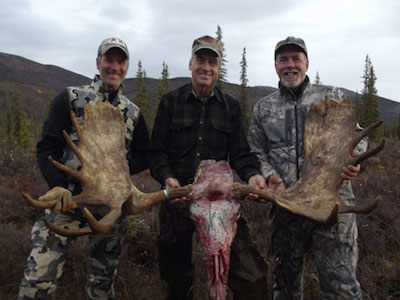
Then, up ahead, there was a massive rock face towering above a large whirlpool of the river. It was the landmark I had longed for since I started this ill-fated ride. The river turned at the rock wall out into the valley and from there it was a straight shot with no sweepers to the camp where Bryan and Kevin were.
I climbed up on my knees, bowed my head and thanked my Lord for bringing me out safely. And I remembered His promise, not to take the problems or trials that test our faith, just the promise to be with us.
I thought of Bryan and Kevin, and wondered what they were thinking. It had been twelve days since I walked out of their camp and they had no way of knowing what had happened. About a quarter mile above their camp I hallowed the camp, and waited, but saw nothing. I glanced at my watch and the dial glowing in the failing light showed 8:30 p.m.
Nearer, I yelled, “Hello the camp,” and then again, louder. Bryan’s face popped out of the brush, and then disappeared. Moments later Bryan and Kevin stepped off the bank and started across to help stop the raft.
I was exhausted, mentally and physically, and the first signs of hypothermia were coming with the cold. My bleeding hands reminded me of the past six hours. Bryan and Kevin were all smiles as I slipped off the raft for the last time. I grabbed Bryan and gave him a bear hug, then Kevin.
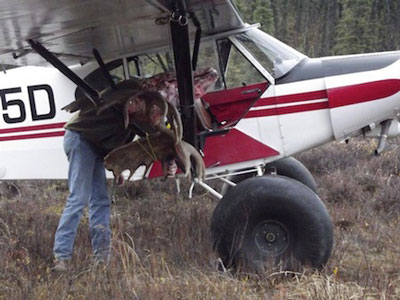 We packed the meat bags and antlers up to the strip, and poured the excess water out of my gear. We dragged the raft up on the bank and surveyed the damage. Bryan shook his head and said, “You really are a crazy man.” I took it as a compliment.
We packed the meat bags and antlers up to the strip, and poured the excess water out of my gear. We dragged the raft up on the bank and surveyed the damage. Bryan shook his head and said, “You really are a crazy man.” I took it as a compliment.
We fished my well-wrapped and mostly dry sleeping bag and some extra Mountain House food out of the gear, then crossed the river and piled into Kevin’s warm, dry tipi. We sat for an hour swapping tales and adventures as Kevin fed sticks to the ravenous little stove. I finally pulled off the hip waders, and water poured out.
After a hot meal, I climbed thankfully into my warm bag. We talked on into the night and, as the conversation faded into silence, I watched the red coals glowing behind the air vents and replayed the day in my mind.
I said a prayer, and once again thanked God for it all, the best trip of my life. Then I thought, at least for now, my search for solitude was complete.
Author’s note: My Bear take down is over 40 years old, and pulls 63 pounds. My 1000 grain arrows are carbon shafts with insulated copper wire and Zwickey Delta broadheads. They sank.



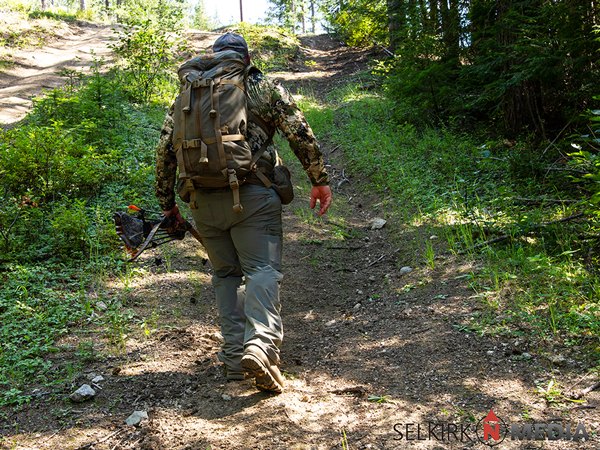



I have been waiting for another of Monty,s stories.That was amazing.Thank you .